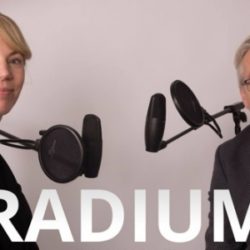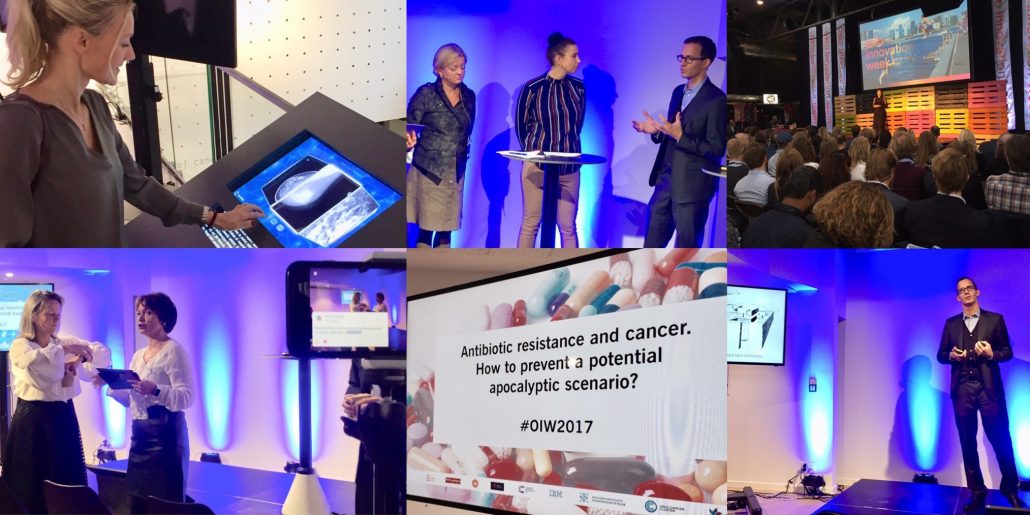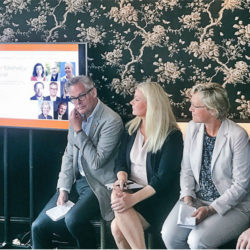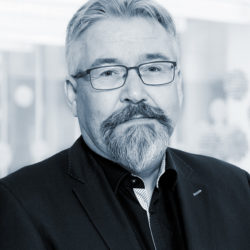Podkasten Radium går live – og vi vil se deg!
Podkasten Radium forflytter seg ut av studioet i Oslo Cancer Cluster Innovasjonspark til Kreftforeningens Vitensenter to ganger nå i mars. Vi håper å se deg blant publikum!
Sammen med Kreftforeningen arrangerer vi to live podkaster i mars.
Se info om seminarene nedenfor:
Investering med hode og hjertet
Temaet for live innspillingen er investeringer i selskaper som utvikler kreftbehandling spesielt, men vi ser og på større deler av helseindustrien.
Gjestene og tematikken for innspillingen er; erfarne investorer som forteller om sine kriterier når de investerer, hvorfor investering i disse selskapene er å investere med hjertet og hodet, samt nytt fra to av selskapene i porteføljen til RADFORSK. Her er det mye kunnskap og tips å hente opp får både investorer og oppstartsbedrifter.
I tillegg kan du stille spørsmål via sms. Og vi serverer lett frokost!
Program
Dag: 16. mars
Tid: 8:30 – 10:00
Dørene åpner kl 8:00 og vi serverer kaffe og lett frokost
Sted: Kreftforeningens Vitensenter, Kongens gate 6 i Oslo sentrum
Moderatorer:
Elisabeth Andersen og Jónas Einarsson fra podkasten Radium
Første panel: Hvorfor velge å investere med hode og hjertet?
• Anne Lise Ryel, Generalsekretær i Kreftforeningen
Andre panel: Hva er kriteriene for å investere i et biotek/kreftselskap – vi spør ekspertene.
• Ingrid Teigland Akay, Managing Partner Hadean Ventures
• Hans Ivar Robinson, CEO Birk Ventures
Tredje panel: Selskaper fra RADFORSK sin portefølje presenterer seg:
• Per Walday, CEO PCI Biotech
• Agnete Fredriksen, President og CSO Vaccibody
Persontilpasset kreftbehandling: Hvordan få kunnskapen og teknologien hele veien til pasientene?
Norsk forskning og teknologi kan i nær framtid bidra til at kreftpasienter får rett behandling til rett tid, tilpasset sin kreftform, såkalt persontilpasset kreftmedisin. Forutsatt at sykehusene tar forskningsresultatene og den nye teknologien i bruk.
I denne live innspillingen av podkasten Radium, så kommer to av Norges fremste forskere for å snakke med Jónas Einarsson og Elisabeth Kirkeng Andersen: Professor Erik Fosse og professor Håvard Danielsen vil fortelle oss om de siste teknologiske gjennombruddene fra to fyrtårnprosjekter som kobler digitalisering med dyp medisinsk forståelse for å utvikle persontilpasset kreftmedisin: BigMed og DoMore!
Hva betyr forskningen for behandling av kreftpasienter? Og hvordan kan vi sikre at for at resultatene tas i bruk? Det skal generalsekretær i Kreftforeningen, Anne Lise Ryel og Ketil Widerberg, daglig leder av Oslo Cancer Cluster, snakke om.
BigMed og DoMore! er begge forskningsprosjekter som er støttet fra Forskningsrådet med over 50 millioner kroner hver seg. Se mer om DoMore! og BigMed nederst i artikkelen.
Vi åpner for spørsmål fra salen på sms.
PRAKTISK INFO:
Dag: 21. mars
Tid: 17:00 – 18:30, Dørene åpner 16:30 og vi tilbyr lett bevertning
Sted: Kreftforeningens Vitensenter, Kongens gate 6 i Oslo sentrum
Meld deg på her.
PROGRAM:
Moderatorer: Jónas Einarsson og Elisabeth Kirkeng Andersen, RADFORSK og podkasten Radium
Persontilpasset kreftmedisin er rett rundt hjørnet: Hva skjer i to av Norges fremste forskningsprosjekter innen området?
- Professor Håvard Danielsen, leder av DoMore! og Institutt for kreftgenetikk og informatikk ved Oslo universitetssykehus
- Professor Erik Fosse, leder av BigMed og Intervensjonssenteret ved Oslo universitetssykehus
Norske kreftpasienter trenger at forskning og innovasjon tas i bruk i sykehus-Norge
- Anne Lise Ryel, generalsekretær i Kreftforeningen
- Ketil Widerberg, daglig leder Oslo Cancer Cluster
FAKTA:
Om BigMed:
«BigMed er et omfattende IKT-prosjekt forankret hos Oslo Universitetssykehus. Prosjektet er et samarbeid som involverer partnere fra pasientorganisasjoner, klinikk, akademia og næringslivet. Formålet er å adressere barrierer for utviklingen av persontilpasset medisin i Norge og legge til rette for persontilpasset medisin ved bruk av stordatametoder. Prosjektet er finansiert av Norges Forskningsråd og prosjektets partnere»
Leder for BigMed er Erik Fosse, professor i medisin ved Universitetet i Oslo og spesialist i generell kirurgi og hjertekirurgi. Fosse leder Intervensjonssenteret ved Rikshospitalet, som er en forsknings- og utprøvningsavdeling for ny teknologi innen medisinsk behandling.
Om DoMore:
Over- og underbehandling av kreft er en belastning for pasienter og samfunn. Som ett av Forskningsrådets tre fyrtårnsprosjekter er oppdraget i DoMore! å løse denne store samfunnsutfordringen gjennom nye IKT-løsninger. Forskerne i prosjektet utvikler datamaskiner som skal kunne gi langt bedre svar på hva som foregår i en svulst enn spesialistene kan med dagens metoder. 7000 pasienter og 20 000 prøver er allerede inkludert i studien som omfatter prostata- tarm og lungekreft. Til sammen utgjør disse formene 44 prosent av alle kreftdødsfall. Målet er å kunne tilby nye og langt mer effektive systemer for diagnostisering og prognostisering av kreft allerede innen 2021.
Leder for DoMore! er Håvard E. Danielsen, genetiker med en ph.d. i medisin og professor ved Institutt for informatikk ved Universitetet i Oslo og instituttleder for kreftgenetikk og informatikk ved Oslo universitetssykehus. I 2017 ble han tildelt tittelen gjesteprofessor ved Universitetet i Oxford. Hovedfokus i forskningen hans er DNA- og kromatin organisasjon og bruk av informatiske verktøy for å forstå genomiske endringer i kreft.
Om RADFORSK og Radium:
I podkasten RADIUM snakker Jónas Einarsson og Elisabeth Kirkeng Andersen om kreft, kreftforskning og porteføljeselskapene i RADFORSK. RADFORSK er et eviggrønnt investeringsselskap som etablerer og har aktivt eierskap i bedrifter som utvikler kreftbehandling.




